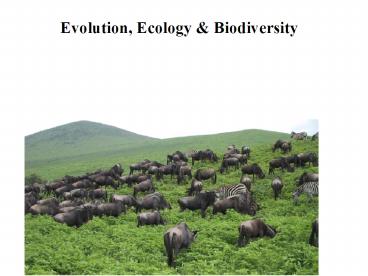Evolution, Ecology - PowerPoint PPT Presentation
1 / 18
Title:
Evolution, Ecology
Description:
... necessary to understand evolution. Evolution is relevant to ... people that evolution had occurred. first to develop a logical, coherent mechanism to ... – PowerPoint PPT presentation
Number of Views:124
Avg rating:3.0/5.0
Title: Evolution, Ecology
1
Evolution, Ecology Biodiversity
2
- This course covers
- Population Genetics
- Evolution
- Diversity of life
- - Ecology
- major theme of course may actually be evolution
3
Population Genetics necessary to understand
evolution
4
Evolution is relevant to understanding virtually
everything about living things!
5
Why are there millions of species on this planet?
What are they? What can we learn from this div
ersity?
6
How do these species interact with each other
their
environment?
7
- Evolutionary thinking
- Evolutionary biology credited to Darwin (1859)
- not first to think of evolution
- Georges-Louis Leclerc (Comte de Buffon) -
1707-1788 - believed in long history of earth, change in
organisms, - noted vestigial organs
8
- Erasmus Darwin - 1731-1802
- believed that life had evolved from simple
origins - - wrote poetry
Organic life beneath the shoreless waves
Was born and nurs'd in ocean's pearly caves
First forms minute, unseen by spheric glass,
Move on the mud, or pierce the watery mass
These, as successive generations bloom,
New powers acquire and larger limbs assume
Whence countless groups of vegetation spring,
And breathing realms of fin and feet and wing.
9
- Etienne Geoffroy Saint Hilaire (1772-1844)
- - variations on single body plan, homologies
10
- Jean Baptiste de Lamarck (1744-1829)
- best known evolutionist pre-Darwin
- believed species change AND suggested mechanisms
- by which it might happen
- tendency to increase in size
- perception of needs
- use and disuse, inheritance of
- acquired characters
11
- Charles Darwin - the man
- first to accumulate sufficient evidence to
convince - people that evolution had occurred
- first to develop a logical, coherent mechanism
to - explain how why evolution happens
12
- keen naturalist, traveled around world on
- The Beagle (1832-36)
- fossils in South America, birds in Galapagos
islands, - etc. led him to question species fixity
13
4 spp. of mockingbirds from Galapagos
14
- influence of geological theories
Lyell Uniformitarianism geological patterns
created by presently observable forces, ancient
history of the earth
15
Started notebook (1837) to record ideas
Many facts suggested evolution, but
needed a theory...
- must produce change
- must account for adaptation
- must explain speciation
16
Inspiration from Thomas Robert Malthus (1798)
- population growth will always tend to
- outrun food supply
- - immediately suggested natural selection
17
Darwins insight in 1838 - quickly developed thi
s into theory explaining how all
living things evolved into their diverse
forms
"is the most powerful and the most comprehensive
idea that has ever arisen on earth. It helps us
understand our origins ... We are part of a tota
l process, made of the same matter and operating
by the same energy as the rest of the cosmos...
" (Sir Julian Huxley)
and then... silence
18
Delayed publishing - started outline 1842
Alfred Russel Wallace sent paper in 1858
outlining
natural selection
Friends arranged for joint reading of papers at
Linnean Society Darwin published The Or
igin of Species in late 1859































